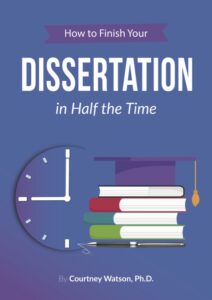The goal of any work of research is to add to the body of knowledge. When thinking about a research question, particularly for a thesis or dissertation, one of your first priorities will be to figure out where to first cast your critical net. The primary goal of this early work is to find a gap in the literature that interests you and seems ripe for further study.
A gap in the literature is an area within an academic discipline that has not yet been studied, or at least not in-depth. Most fields have undiscovered territory, and it’s the job of the researcher to mine these unexplored ideas to open up new lines of inquiry. It’s like panning for gold; you sift through the dirt and rubble until you find a little piece that catches the light. Then, you polish it and make it your own.
Before embarking on your research and searching for a gap in the literature, it’s a good idea to consult with your dissertation advisor and any faculty members in your department who are subject matter experts.
These are a few questions to consider:
- Why do we look for a gap in the literature?
- Where do we find a gap in the literature?
- What does a gap in the literature mean?
- What if there are no gaps in the literature?
Why Do We Look For Gaps in Literature?

Academic research is literally the production of knowledge. The goal of any academic endeavor is to produce knowledge, either through additional research, replication, revision, or a greater depth of understanding than what was there before. By pushing the limits of what is known, academic scholarship is ever-expanding and evolving, which is how progress is made and measured.
When researching a doctoral dissertation, it is essential for a Ph.D. student to find a gap in the literature. This gap will form the basis of your research question, which is the driving force of your dissertation. By mapping this new scholarly territory, you will stake your claim and mark it as your own. The gap becomes your defined area of study and a mark of your expertise in the field.
Where to Find a Gap in Literature
The goal of your countless hours of preliminary research and your literature review is not only to gain a rich and deep knowledge of your field, but also to train yourself to see what isn’t there. Though this is a challenge, especially at first, the more you read and the more questions you explore within your topic, the more critically you will examine it. When you gain enough knowledge to be in conversation with texts in your field, you will start asking questions and eventually land on one that no one has asked before.
To find a gap in the literature, start broadly and narrow down using context. For instance, a search of “health disparities” in the literature yields thousands of results. But once you begin winnowing down the search by region, race, ethnicity, and socioeconomic factors, a clearer picture emerges about what has been studied and how recently, as well as demographics that have been overlooked by researchers. When a gap like this emerges, do a deep dive to determine how extensive it really is.

For me, finding a gap in the literature is one of the most exciting parts of academic research. It’s very gratifying to experience the thrill of discovery and know that I’m making connections between disparate ideas that have never been made before. When I was writing my dissertation about literary tourism and tourist sites in the South, I loved turning a critical lens on authors that hadn’t been looked at in this context before.
What Does a Gap in the Literature Mean?
This is a great question, and one with multiple answers. As a researcher, when you find a gap in the literature, it is vital to ask yourself why this area hasn’t been explored before now. While the body of knowledge is vast, academics tend to travel well-beaten paths and often pursue similar avenues of inquiry. So, before you celebrate hitting intellectual paydirt, make sure you know the reason for the gap.
The best-case scenario is that, after doing your due diligence, your tenacity paid off and you struck gold. While this does happen for most academics eventually, it is not uncommon to experience a few false starts. There is a big difference between a question that has never been explored and a question that has never been explored by you.
The reason for some “gaps” in the literature becomes obvious once you dig a little deeper. There may be a gap because something very similar has already been studied, and you just didn’t know about it yet. Sometimes, it just looks like there is a gap in the literature because your search parameters are too narrow, or your research hasn’t gone back far enough. Side note: know when the landmark studies in your field were published.

When you dive into research for your dissertation, you will “discover” many ideas that feel fresh and new, but the reality is that you’re the one who is fresh and new. And that’s okay! You are not expected to know everything that has ever happened in your field. Yet. When I was searching for a gap in my field to plant my flag, I made a note of everything that felt like a “gap” and researched it further to find out if it was a real gap. Eventually, it was.
What if There Are No Gaps?
There are. Don’t fret; if you haven’t yet found a gap in the literature in your research, you will. I always marvel at the wealth of topics in fields like Shakespeare Studies, where they’ve been writing about the same 36 plays for over four centuries. And yet the research that gets peer-reviewed and published is still interesting and even innovative as each successive generation of scholars makes the field their own. If the Shakespeareanists can do it, so can you.
To find a gap in the literature in your field, you may have to turn over every stone and consider possibilities you never thought of before. That’s what research and scholarship are. While you may never get the opportunity to work with new source material (though I feel we’re all entitled to stumble upon at least one long-lost manuscript stuffed in an attic), you can always find a new perspective or critical lens that hasn’t been considered before. Let that serve as your undiscovered country.

